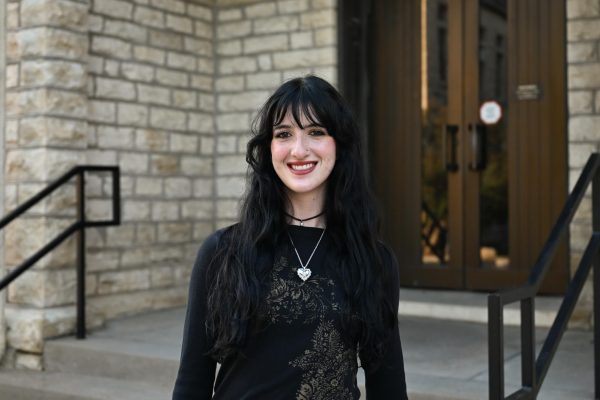Protestors lined Poyntz Avenue for the second-ever No Kings Day protest on Saturday, Oct. 18, voicing dissent against President Donald Trump. Hosted by pro-democracy group Indivisible MHK, the Manhattan protest was one of over 2,700 in the country, following the first No Kings Day event in June.
“No Kings; it’s a reminder of the history of this country that most people are familiar with,” Philip Nel, governing board member for Indivisible MHK, said. “We overthrew a king, and now we have a president who would like to be a monarch. … We’re in the period of autocratic breakthrough where the autocrat is trying to consolidate his power and act with impunity.”
The event began at 2 p.m. at Larry Norvell Band Shell, where Indivisible MHK board members Nel, Amber Starling, Jordy Sargent and Rev. Margaret McGhee gave speeches. Protestors then marched to Poyntz Avenue.
With 50 protests held Saturday in Kansas, the total number of protestors in the state was over 39,000, according to Kansas 50501 member Christie Peterson.
1,600 attended the Manhattan rally, but Nel said the number of protestors isn’t what truly matters.
“I thought we would get a turnout,” he said. “I didn’t know if it would exceed the previous [No Kings protest] or not, but I think the way forward is to do what is right for its own sake, not count on higher numbers or be worried about lower numbers.”
The Manhattan protest remained peaceful, with an environment Nel described as “joyful.”
“Inspired by the good people of Portland, we too had people in costumes,” he said. “We had people dressed up as unicorns, as T. rexes, Patrick from SpongeBob Squarepants. … It was very joyful, and I think that joy is really important in fighting autocracy; not just to sustain your own spirits, but also because they [autocrats] don’t like to be laughed at. They cannot win our respect, so they try to make us afraid.”
Ashe Vujevic, senior in wildlife biology and social transformation studies, attended the rally. They said Trump’s immigration policies are one key issue they wanted to protest.
“Due process is a very valuable thing and it’s something that our country was built off of,” Vujevic said. “It is something that is inherent to our Constitution, and those rights have been completely stripped away from immigrants and illegal immigrants. We’ve seen that these attacks aren’t only happening on illegal immigrants, but on people of color and people who fit into [the] criteria.”
Vujevic also said they wanted to protest Trump’s policies on LGBTQ+ rights.
“There have been thousands of anti-trans bills released over the last couple of years prohibiting things like gender-affirming care for minors, bathroom bans, drag queen nights, things like that; and a lot of these rulings have put a lot of people that I care about in danger,” Vujevic said. “We’ve seen, with SB 125, that it has a significant impact on the foundation of [Diversity, Equity, Inclusion & Belonging] that we had at our school.”
Attendees of the protest were mostly older white individuals, and Vujevic said they usually observe a younger demographic protesting against the Trump Administration.
“The main message above all was just ‘treat people how they deserve to be treated,’” they said. “I saw a lot of religious messaging that was like, ‘love thy neighbor.’ A lot of ‘peace is what we need in this world,’ so it was a really positive vibe overall. It was just a demographic I was not expecting, so it gave me a lot of hope for the movement.”
Though 1,600 people attended the No Kings protest, some students, like Thomas Adcock, felt it was unnecessary.
“America, at its founding, being a Protestant nation, has been against the idea of having a king rule the land,” Adcock, senior in history, said. “Trump is not a king; he is an elected official who was elected by the Electoral College and won the popular vote. When his term is up, the next elected president will take his place. So, I do not see the reason for people to be protesting.”
However, Nel said Trump’s response to the nationwide No Kings protests suggests he sees himself as a king.
“He actually posted an AI video of himself wearing a crown, flying a jet and sh—ing over people, which I thought was a little on the nose,” Nel said. “That’s the kind of thing you can imagine someone critical of him doing, and he sort of embraces his role as an imaginary tyrant.”
Nel said the goal of protests like No Kings is not to immediately influence federal policy, but to weaken a regime.
“The scholar Erica Chenoweth speaks of 3.5%, and they have arrived at that number with their research partners after studying nonviolent social change across a couple hundred years and lots of different countries,” he said. “They find that when 3.5% of the population engages in sustained, nonviolent protests … that you can topple a regime.”
Another goal Indivisible MHK had for Saturday’s protest was to collect food for those in need, an initiative headed by Amber Starling, Katherine Schlageck and others. The organization collected 609 lbs of food from attendees of the No Kings rally.
“Our concern was, in particular, people on the military base showing up and seeking food and seeking aid at places that provide that, and so we thought we need to do something,” Nel said.
As for the future, Nel said Indivisible MHK plans to keep fighting, and encouraged citizens to do the same.
“Wherever you are, in whatever way you can, do not obey,” he said. “In advance, do not comply with malicious orders. That’s gonna take different forms depending on where you work and depending on your own level of vulnerability. Risk is not evenly distributed throughout society, and I completely understand why some people decided not to protest, even though they feel themselves aligned with those who did. There are always risks involved, but the greater risk is fascist America for generations to come, so I would encourage people to take what risks you can. This is easier to fight now than it will be in the future.”

























































































































